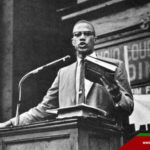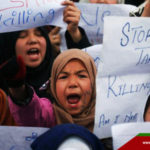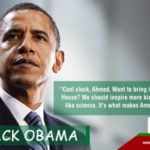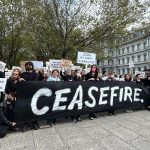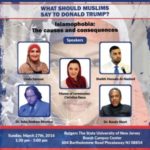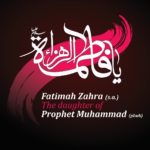By Fatima Kermali
On October 16, 2022, Muslims for Peace held their 16th Annual Prophet Muhammad Interfaith Conference. The main topic for the conference this year was: Family: In the Traditions of Major Faiths. This year, four key speakers took to the podium: Professor Juan Cole from the University of Michigan, Scholar Sayed Jawad Qazwini, and Authors Walter Ruby and Sabeeha Rehman.
The conference commenced with the recitation of the Holy Quran which movingly delivered the message on the manners of treating one’s parents and other relatives from Chapter 17 or Surah Isra.
 Thereafter, Congresswoman Bonnie Watson gave the opening remarks on the similarities that Muslims and Christians have with one another, such as serving one God. She continued to make other comparisons about how parents and the elderly are treated in both traditions. She stated, “Feeding the poor, taking care of the widow, visiting the one in prison, being kind to one another are the same things I sense and get being around my friends who are Muslims.”
Thereafter, Congresswoman Bonnie Watson gave the opening remarks on the similarities that Muslims and Christians have with one another, such as serving one God. She continued to make other comparisons about how parents and the elderly are treated in both traditions. She stated, “Feeding the poor, taking care of the widow, visiting the one in prison, being kind to one another are the same things I sense and get being around my friends who are Muslims.”
She expressed that attending the conference and speaking allows her to share her faith as well as to know people of other faiths who believe in the one true God. She emphasized that this was a blessing, and it is what makes America great as well as one of the most exciting countries in the world.
The moderator, Sarah Mokh, followed by briefly conveying the reason why the topic- ‘Family’ was chosen for Prophet Muhamad’s Day. She explained, “By looking at the Prophet’s family which, formed the core of love and respect in which everything else flowed, into the community, he had asked the community nothing more than the love for his family and the worship of the one God. This plea underscores the fact of how all faith traditions see the family as the locus of everything, because if there is not a proper moral structure built within the family then nothing else matters.” She pointed out that much of the Quran devotes itself to the family and how one should deal with parents and other members. It mentions the stories of the prophets which are stories of families like Prophets Yusuf, Jacob, and Joseph which discusses the trauma, jealousy, and tensions that exist in the family and how it plays out. The Holy Quran also speaks about the mercy and love that exists. Furthermore, Sarah expressed that people of faith live in a secular society and many buy into myths that society imposes. For instance, religion is something private and regulated to only places of worship. But rather, she emphasized that having spaces like these gives people a place, “where we reflect on the shared elements of our faith and speak to one another about the most important components of our faith, like family, it is so, so important”. She found that modern secular society does not respect family in the same way that religious traditions do. The modern view of family is something unfortunate, to be dealt with, and silly, an image that is pushed in media, film, and books. “Through these talks, we can come back to what it means to be a part of a family and a ‘faith family’ such as the believing men and women as they are a family.”
Two other speakers went forward to discuss the faith family which is the Abrahamic family. Walter Ruby and Sabeeha Rahman are co-authors of the book: We refuse to be enemies How Muslims and Jews can make Peace, one friendship at a time. Both shared their experiences and perspective as a Jew and a Muslim as they aimed to share their common roots in the Abrahamic family. Hence, Walter termed Sabeeha as his sister-both coming from the Abrahamic family. They also discussed the dysfunctions that exist and how to restitch that family.
Walter mentioned that the personalities known by the Jews, are also honored by the Muslims as great prophets and righteous women. He gave a brief history of Prophet Abraham and Ladies Sarah and Hagar tying it into the present-day situation regarding the creation of the Jewish state and the exile of Palestinians that caused a further rift. Both these speakers’ goal was to restitch the ties as he considers it to be holy work. He found it necessary to celebrate the common principles “and not allow the differences between Israel and Palestine to tear people apart here in America.”
Sabeeha commenced by noting that last week was the birthday of Prophet Muhammad (p) and Yom Kippur. This reminded her of an incident that occurred when the Prophet (p) migrated to Medina. The Jews were fasting on the 10th day of the new year. At the time, both Muslim and Jewish new year’s coincided. He asked the Jews why they fasted. They stated it was to commemorate Moses’ exodus in leading the Israelites out of bondage. He then said, “Moses is closer to me than he is to you.” Out of solidarity, Prophet started fasting with them. This is one of many examples of respecting another’s tradition.
Sabeeha commented that growing up in Pakistan, her perception of Jews was through the lens of the Israeli-Palestinian conflict. Walter then explained his experiences as a Jew growing up in America. He hadn’t met a Muslim until he was in his twenties. Sabeeha hadn’t met a Jew until she was in the United States in the early 70s at a hospital Christmas party where almost half of the residents were Jewish. The Jews were kind to her which baffled her as she could not reconcile her negative views of Jews and her present reality. She found her neighbor and her husband’s boss and mentor were both Jewish and kind. Then she moved into an orthodox Jewish neighborhood. Her father who visited advised her, “People of faith, no matter what their faith, make good neighbors. This community will be good for your children because they will raise your children in a disciplined manner as they are people of principle.”
Walter then spoke about his encounter with Muslims whom he didn’t meet until he moved back to Israel. He was a journalist covering northern Israel where there were many Arabs. During that time, he learned the power of one-on-one personal encounters. He felt so warmly received by the people. Yet, when he would go back to Haifa and relate it to his friends and relatives, they would say he was naïve. From these experiences, he realized the importance of true human contact. He felt that is the way to peace.
Sabeeha spoke about her desire to mend the bridge between the two groups of people. She started to introduce her Jewish friends to Muslim Pakistani friends to broaden their minds about each other. This grew into larger gatherings and spaces. Thus, Sabeeha started from the ground up. For Walter, it started from the top down. He was first hired by a Foundation to be a Muslim Jewish Program Director which he did for 10 years. Thereafter, Sabeeha and Walter decided to work together and send a message regarding the importance of interfaith dialogue by focusing on the 4 sacred spiritual principles that unite both traditions. She then listed them to be the following: “If you save one person you save the world, if you take one life it is as if you killed the whole of humanity.” Secondly “Welcome the stranger”. Thirdly, “Reform and repairing the world.” This is when both groups of people stand side by side either in soup kitchens feeding the needy or in hospitals taking care of the ill. She said that is when the magic happens. The fourth is “Standing up for each other.” She described an instance on a Sunday when the travel ban was implemented as people stood with banners stating: “Today I am a Muslim” but were not Muslims; yet, stood in solidarity with Muslims against the ban. Muslims, on the other hand, raised funding for the Jews after the massacre at the Tree of Life Synagogue.
Towards the end, they discussed the disagreement that existed between the two faiths due to the misconception of how Lady Sarah, the wife of Prophet Abraham is viewed which is derived incorrectly from historical incidents.
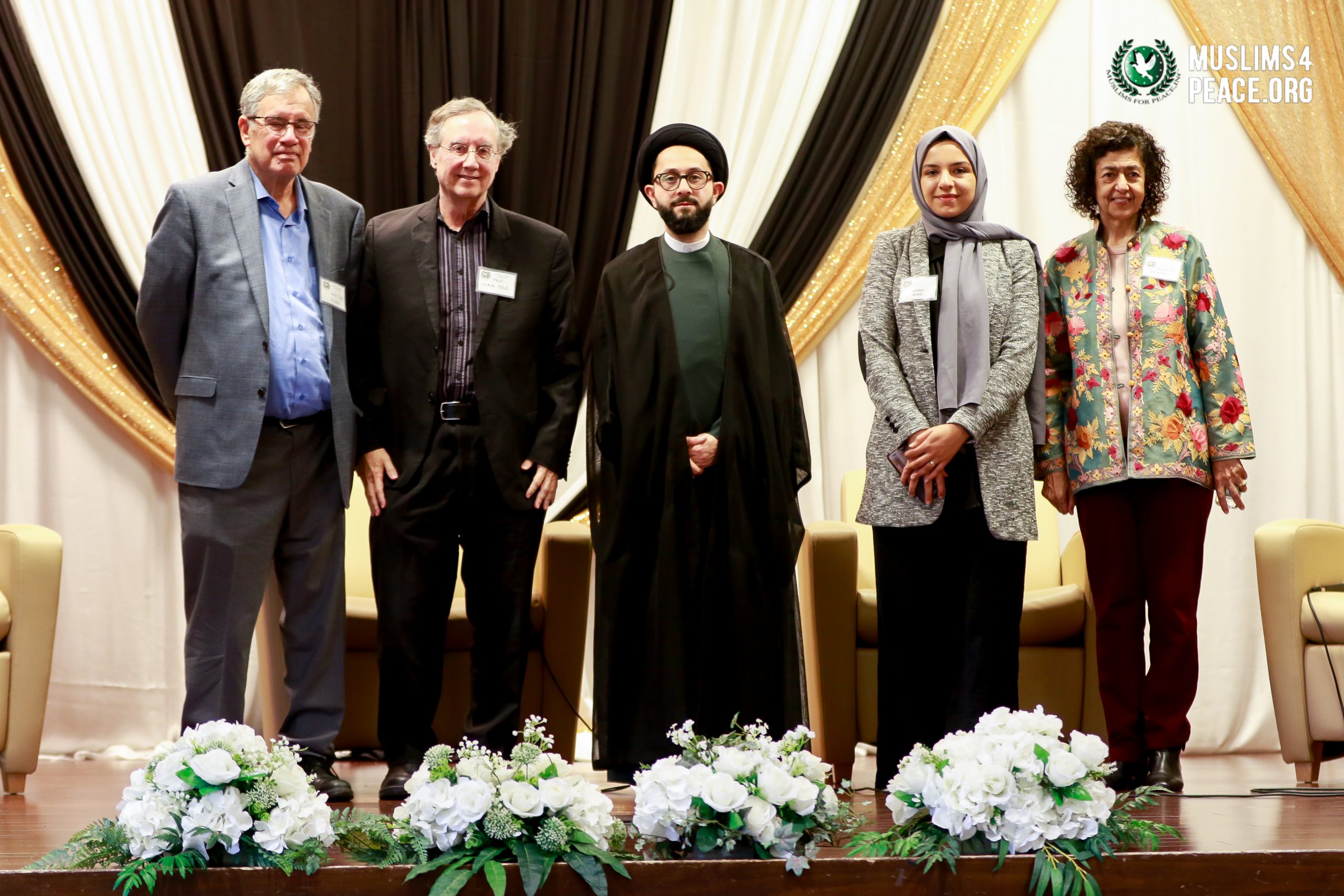 Thereafter, Sayed Jawad Qazwini spoke about the need for children and people to have peace and love within their homes. Many do not see the actual lives of the poor and the realities of society. He stated almost every single household in this country carries some sort of pain regardless of what religion is followed. Sayed mentioned every year 350 million children are born into this world, either into wealth or into poverty. Yet, the message of the Holy Prophet and the messengers of God was one: You are all citizens of the earth. Your father and mother were Adam and eve, so act like brothers and sisters.
Thereafter, Sayed Jawad Qazwini spoke about the need for children and people to have peace and love within their homes. Many do not see the actual lives of the poor and the realities of society. He stated almost every single household in this country carries some sort of pain regardless of what religion is followed. Sayed mentioned every year 350 million children are born into this world, either into wealth or into poverty. Yet, the message of the Holy Prophet and the messengers of God was one: You are all citizens of the earth. Your father and mother were Adam and eve, so act like brothers and sisters.
He further emphasized the importance to give undivided attention to children, not just physical closeness but spending quality time with the family which is an Islamic teaching. Sayed elucidated that love is time. He noted it also applies to God. Talk to God, as God teaches us that he wants us to show our dedication to Him. He doesn’t need it, we need it. Same with family they not only need it, but we need it. Listen to them and prioritize them. Let them feel they are the future of our community. Sayed emphasized “let us raise leaders who will rise to the occasion not run away from responsibility and that is the job of the home. Islam teaches us that family is the most important institution that we can engage in.”
Sayed then mentioned a story in the life of the Prophet (p). During the early days of his mission, 3000 enemies came to Medina to annihilate the Muslims. the Prophet wanted a few men to fight because they were outnumbered and needed to defend themselves. The young men from Medina gathered. one man came but he was sad. The Prophet asked him why. He explained that his mom was crying because he was the only one, she had. I told her I am going to fight alongside the Prophet, but she was still sad..
Then the Prophet said just like you brought tears to her eyes make her happy and return to her. Sayed then questioned, “What was the Prophet fighting for?” It was for people to be happy, and to understand the value of family. Then he quoted the words of the Prophet who said, “Paradise lies under the feet of the mothers.”
Sayed explained that he left the world with a legacy of unbelievable compassion love, forgiveness, and tolerance.
He shared another story of a man from the battle of Badr caught as a prisoner. They brought him to the Prophet and asked him why he was there. He said he was paid to kill the Prophet, but he failed. So, the Prophet asked him, “What should I do with you?” He said, “O’ Muhammad forgive me because I have children.” The Prophet forgave him. In another battle, he was caught again, and they brought him to the Prophet. Again, he said I was given a mission to kill you. The Prophet asked again, “What should I do with you?” he answered, “I have children forgive me.” The Prophet forgave him because the Sayed remarked he represents God. Again, while liberating Mecca the same man was brought to the Prophet. The Prophet was laughing, “What is wrong with you?” The man said you forgave me twice, forgive me again for the sake of the children, and the Prophet forgave him. He explained that this is the compassion and tolerance this world needs. Even Wahshi who killed the Prophet’s beloved uncle and amputated his limbs was forgiven by the Prophet.
Therefore, Sayed concluded that through tolerance we can bring together everyone with different backgrounds and faith.
During the conference, Mayor Derek Armstead (the first African American Mayor of Linden) spoke and brought in an interesting perspective as his family consists of both faith traditions. The family on his father’s side are Christians and the family on his mother’s side, his uncles are Muslims. Thus, he was exposed to both belief systems which brought him a deeper understanding of people.
Professor Juan Cole was another keynote speaker who brought further knowledge and wisdom to the Conference. He is an author who has written, edited, or translated 21 books and authored over 100 articles and chapters and is a Collegiate Professor of History at the University of Michigan. Cole has devoted his career to understanding the Middle East and the Muslim world.
He began with a verse from the Quran about parents and their obligations towards them and others. He then talked about parents who are pagans and that their faith should not be followed but at the same time, ties should not be cut off with them as well. He pointed out that while the Quran speaks of the horrendous punishments for the pagan and the impious at the same time, mentions the compassion that must be meted out to them while keeping familial relations. He pointed out that in the first six or seven hundred years of Islamic history the Christians were a majority in the east. It took a while for people to embrace Islam, so the Quran is diligent in speaking about others when it comes to having cordial relationships especially when they are a part of kin. He then talked about the story of Prophet Joseph and the familial relations associated.
During the program, the first award was given to Freshta Taeb and Sikandar Khan for the MFP Humanitarian Award “An Inspiration to Inclusion and Diversity”
Freshta is the Managing Director of FT Translation Services. She had a long and successful career serving the needs of others specifically the marginalized, low-income refugee families of, mainly, South, Central Asian, and Middle Eastern descent.
Sikandar Khan is the Executive Director, of Global Emergency Response and Assistance and is an elected ward leader for Paterson, New Jersey. He has extensive experience serving his community, including as Commissioner to the Paterson Board of Adjustment, and Coordinator and as the Senior Economic Development Representative to the City of Paterson. As Executive Director he oversees the overall strategic direction of the organization
Their humanitarian work for the Afghans has been overwhelming.
The second award given was to Dr. Hasnain Walji for the Lifetime Community Services Award in “Inspiring us to build a peaceful community”
Hasnain Walji, Ph.D. is an educator, speaker, historian, filmmaker, author, and scientist in the field of nutrition with 26 books to his credit. With almost half a century of voluntary service in the nonprofit sector, he has developed deep insight into how communities can address social challenges as they confront new realities. His active engagement on many boards ranging from The World Federation of Khoja Shia Communities, Universal Muslim Association of America, National Muslim Catholic, Dialogue, the Interfaith Peace Ministry of Orange County, The Shura Council of Southern California, The Shia Muslim Council of Southern California, American Muslim Health Professionals and ISEEK (International Society for Education Enlightenment and Knowledge, all demonstrate the breadth of his socio-political endeavor in tackling social injustices that confront our civil society.
Currently, he serves as Executive Director of United Global initiative – an international NGO with a focus on women’s empowerment and children’s health. A signature project of UGI is Code Girls with a mission to empower more women in the Tech Sector in Pakistan. UGI also runs water projects to provide clean water to rural communities in Pakistan as well as Vitamins to women and children in developing nations. His passion is to make this world a better place for his seven grandchildren.
When receiving his award, he took the opportunity to call the Muslims for Peace team to the front for a standing ovation, commending them for the fourteen years of service they have put in.
Furthermore, He went to his advice, “To inculcate that level of service, is one critical ingredient and that critical ingredient is empathy. If you are in public service, serving humanity if the element of empathy is not present it becomes just another routine thing that I’m a part of a nonprofit and I am doing things. Empathy is to see with the eye of another to feel with the heart of another and to understand.”
He narrated an incident whereby a man comes to the Prophet and brings him some fruit. The Prophet tasted it, then finished the fruits. The farmer was happy as he thought the fruit must have been nice as the Prophet ate it all. The companions asked the Prophet why he did not offer them any. He smiled and said nothing until the farmer left. He said the fruit had not ripened and was bitter. “If any of you ate this fruit, you would have mentioned and shown it was bitter and would have hurt the sensitivity of the man. It was better to eat the bitter fruit than hurt the heart of a believer.” Dr. Walji said that is the level of empathy we must have to be of service.
Thereafter, Muslims for Peace awarded Dr. Mohammad A. Zubair the MFP Leadership Award for Leadership with Ethics, Morals, and Values.
Dr. Zubair is a physician specializing in pulmonary disease and sleep disorder medicine in New Jersey for nearly 30 years. He was appointed by New Jersey Gov. Phil Murphy and confirmed by the state Senate on March 9, 2021, Rutgers University Board of Governors. Zubair, who has extensive experience treating underserved populations in urban centers, is director of the Sleep Disorder Center at Newark Beth Israel Medical Center, an attending physician for the brain trauma unit at JFK Medical Center in Edison and he runs his clinic in Woodbridge. With the help of other Pakistani American physicians, he also established a free clinic in Plainfield, open Sundays, to fill a gap in community health care. He has served as chairman of medicine, director of pulmonary medicine, and director of respiratory and sleep disorder medicine at Bayonne Medical Center. A prominent leader in the state’s South Asian and Muslim communities, Zubair is a founder of both the Association of Physicians of Pakistani-descent of North America – New Jersey Chapter and the state’s Pakistan Day Parade.

